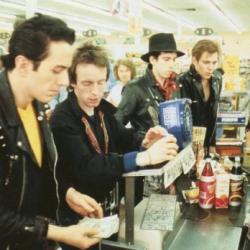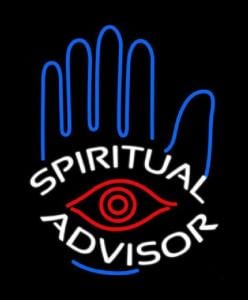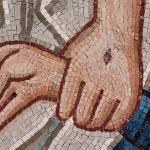Suzanne Fields of The Washington Times wonders why Johnny Cash’s deep Christian faith is widely respected, while President Bush’s is viewed with suspicion. After all, she says, both “were strongly influenced by the evangelistic preaching of Billy Graham.”
That’s true. But it’s about the only similarity one can draw between the two. George W. Bush views himself as God’s hand-picked president — a cowboy in a white hat. He couldn’t be more different from the Man in Black.
Look at one of Cash’s biggest hits, “Folsom Prison Blues,” in which he identifies with the outcast, the prisoner, the evildoer who “shot a man in Reno, just to watch him die.” From his cell he hears the train whistle and thinks of the “rich folks eatin’ / In a fancy dining car,” obliviously passing by in blissful comfort. Which group do you think Bush identifies with?
Johnny Cash took sides. So does George W. Bush. And they chose opposite sides.
Nowhere is this clearer than in “The Man in Black,” in which Cash makes more than just a fashion statement:
I wear the black for the poor and the beaten down,
Livin’ in the hopeless, hungry side of town,
I wear it for the prisoner who has long paid for his crime,
But is there because he’s a victim of the times.I wear the black for those who never read,
Or listened to the words that Jesus said,
About the road to happiness through love and charity,
Why, you’d think He’s talking straight to you and me.Well, we’re doin’ mighty fine, I do suppose,
In our streak of lightnin’ cars and fancy clothes,
But just so we’re reminded of the ones who are held back,
Up front there ought ‘a be a Man In Black.I wear it for the sick and lonely old,
For the reckless ones whose bad trip left them cold,
I wear the black in mournin’ for the lives that could have been,
Each week we lose a hundred fine young men.And, I wear it for the thousands who have died,
Believin’ that the Lord was on their side,
I wear it for another hundred thousand who have died,
Believin’ that we all were on their side.
In line after line of that song Cash is taking sides. And in nearly every case, he takes a stand against something that George W. Bush stands for. Yes, as Fields points out, Bush and Cash both speak out for “the words that Jesus said” — but those words seem to have very different implications for the two men.
If there’s one thing President Bush insists upon — one thing that he wants the world to know about him — it is that he has a “good heart.” (See here for more on Bush’s obsession with “good-heartedness.”)
Cash never made such a claim. “I keep a close watch on this heart of mine,” he sang in “I Walk the Line.” He always viewed his own heart with a wary suspicion, serving more often than not as the anti-hero of his own songs. Like many a great bluesman, Cash sang of faithlessness — but that faithlessness was his own. He was never a victim crying for pity, but a sinner crying out for grace.
Bush declares himself a champion of unquestioned and unquestionable goodness, battling the evildoers. Cash declares himself an evil man, battling to be good. Cash’s faith was like that of the man who said to Jesus, “Lord I believe, help my unbelief.”
Suzanne Fields wants us to think that George W. Bush is just like Johnny Cash, but the difference between the two is as great as the difference between pride and humility, between white and black.
















